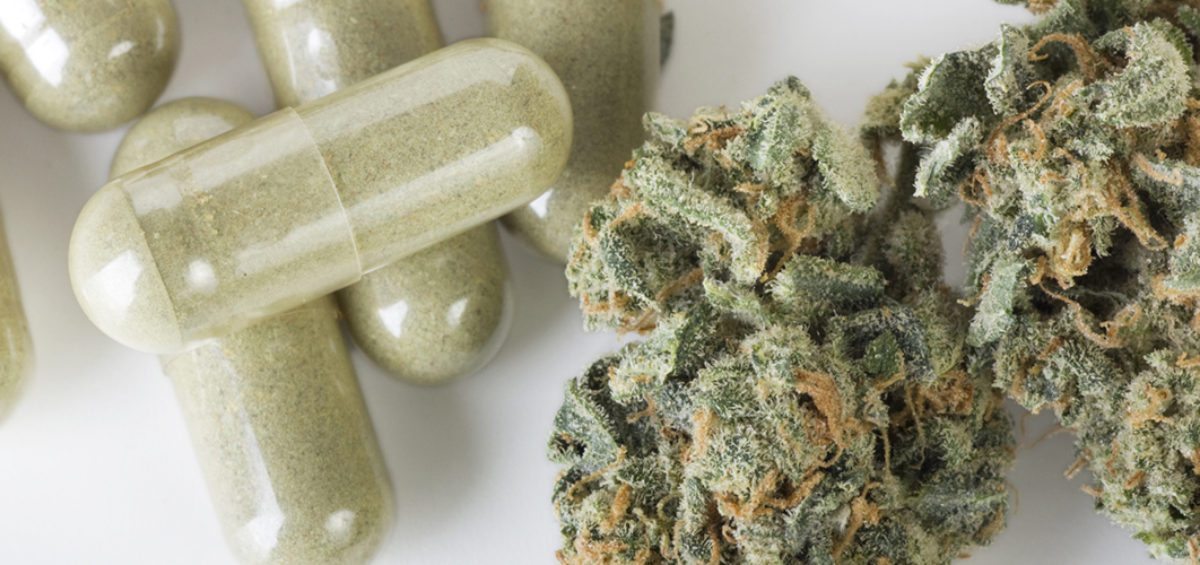[vc_row][vc_column][vc_column_text]
Findings in a new research review indicate that cannabidiol (CBD) can help those addicted to opioids by reducing cravings and withdrawal symptoms.
Studies indicate that cannabidiol (CBD), a natural cannabinoid found in cannabis, effectively reduces the cravings and withdrawal symptoms in those addicted to opioids, a new research review concludes. Yasmin L. Hurd, PhD, the Director of the Center for Addictive Disorders for the Mount Sinai Behavioral Health System, examined the findings of animal studies and a small human pilot and published her findings in the journal Trends in Neuroscience.
Doctors commonly prescribe opioids for the management of severe or chronic pain. The powerful medications bind to opioid receptors throughout the brain, spinal cord, and other areas of the body, which in turn reduce the perception of pain and produce a sense of well being. Opioids, while effective, carry a high risk of abuse and addiction, and every day in the U.S. 78 people die from an opioid-related overdose.
Hurt found that findings in animal model studies indicate that cannabis can help in the treatment efforts of those addicted to opioids. In particular, there’s accumulating evidence suggesting that CBD reduces both withdrawal symptoms and the rewarding properties of opioids to decrease cravings.
“If you look at both drugs and where their receptors are, opioids are much more dangerous in part because of the potential for overdose. The opioid receptors are very abundant in the brainstem area that regulates our respiration so they shut down the breathing center if opioid doses are high,” said Dr. Hurd. “Cannabinoids do not do that. They have a much wider window of therapeutic benefit without causing an overdose in adults.”[/vc_column_text][/vc_column][/vc_row][vc_row][vc_column][vc_single_image image=”17975″ img_size=”1200×250″ onclick=”custom_link” img_link_target=”_blank” link=”https://www.medicalmarijuanainc.com/what-is-cannabidiol/”][/vc_column][/vc_row][vc_row][vc_column][vc_column_text]Despite the dangers of the drugs, sales of prescription opioids in the U.S. nearly quadrupled from 1999 to 2014, according to the Center for Disease Control and Prevention. Policy makers have only recently acknowledge the nation’s epidemic of opioid overdoses. With cannabis proving to be a non-addictive and effective pain-relieving agent itself, researchers have encouraged doctors to recommend cannabis rather than opioids to their patients with chronic pain. Recently, a nationally recognized pain physician announced he was focusing his efforts on making cannabis an accessible pain management alternative to prescription opioids.
While medical marijuana laws have been passed in 28 states, cannabis continues to be a neglected option by medical professionals because of the lack of clinical research. To be approved by the Food and Drug Administration, cannabis’ effects on humans needs to be tested by more. Unfortunately, cannabis’ Schedule I classification under the Controlled Substances Act makes it difficult to study the substance, particularly in clinical trials.
“Surprisingly, the scientific community has been largely missing from most conversations and policymaking decisions regarding the legalization of marijuana for medical purposes. Normally, preclinical models provide the foundation for clinical trials and then, after years of rigorous, structured scientific investigations, accrued evidence is evaluated by federal agencies to determine whether a particular compound should be approved for the treatment of specific symptoms/disease,” said Dr. Hurd. “For marijuana, such a bar has not been met. Decisions across the country have been driven, in large part, by anecdotal reports and lobbying efforts by a growing marijuana industry. Despite the challenges of prescribing the medical use of a plant without the normal, rigorous clinical study process and within our existing clinical structure, specific constituents of the plant could be more easily developed for medical indications.”[/vc_column_text][vc_single_image image=”17843″ img_size=”1200×250″ onclick=”custom_link” img_link_target=”_blank” link=”https://www.medicalmarijuanainc.com/medical-marijuana-can-curb-opioid-use-study-indicates/”][/vc_column][/vc_row][vc_row][vc_column][vc_column_text]Hurd is now running a larger trial to further investigate whether cannabis could help people that are addicted to opioid substances.
“We have to be open to marijuana because there are components of the plant that seem to have therapeutic properties, but without empirical-based research or clinical trials, we’re letting anecdotes guide how people vote and how the policies are going to be made,” said Dr. Hurd. “For one of the first times in U.S. history, it is the general public and politicians, not scientists and physicians, who are determining the medical value of this drug in states where marijuana use has been legalized for medical purposes. Clearly, the legalization of marijuana has outpaced the science. But if we want to be able to accurately say something is medical marijuana, we have to prove that it is, indeed, medicinal.”
You can read the entire study, “Cannabidiol: Swinging the Marijuana Pendulum From ‘Weed’ to Medication to Treat the Opioid Epidemic” via Cell Press.
Learn about the research that has been done on cannabis’ effects on pain by visiting our education page.[/vc_column_text][/vc_column][/vc_row]






